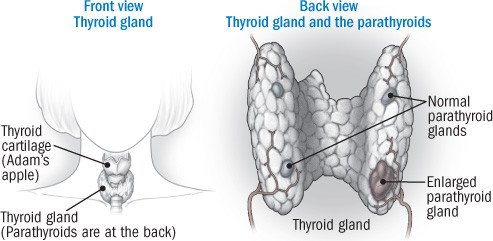Parathyroid Cancer
Medically reviewed by Drugs.com. Last updated on Oct 11, 2023.
What is Parathyroid Cancer?

Parathyroid cancer is a very rare cancer that develops in the parathyroid glands. A pair of these pea-sized glands sits next to the thyroid on either side of the front of the neck.
The four parathyroid glands produce parathyroid hormone (PTH). This chemical:
- raises calcium levels in the blood by forcing the bones to release calcium
- stimulates the intestines to absorb more calcium from food
- signals the kidneys to withhold calcium from the urine.
Healthy parathyroid glands adjust their production of PTH to keep blood calcium levels within a normal range.

When parathyroid cells become cancerous, they multiply out of control. They usually form a firm, grayish-white tumor. The tumor can invade the thyroid gland and neck muscles.
As the cancerous cells grow, they usually produce too much PTH. This causes abnormally high levels of calcium in the blood (hypercalcemia). PTH can get so high that the bones pour out too much calcium. This can cause bone pain and lead to osteoporosis (thin, brittle bones).
Elevated levels of PTH also force the kidneys to retain large amounts of calcium, triggering the formation of kidney stones. Very high calcium can also cause kidney damage, dehydration, and confusion.
Parathyroid cancer most often occurs in middle-age adults. Because it is so rare, researchers have not determined whether specific environmental or lifestyle factors increase the risk of this cancer. Some cases seem to have a genetic link, with several generations of a single family affected.
Symptoms
Symptoms of parathyroid cancer may include:
- a small lump in the front of the neck
- pain in the back or side and blood in the urine (caused by kidney stones)
- bone pain
- hoarseness (caused by cancer invading the vocal cords or their nerves)
- trouble swallowing
- constipation
- urinating more than normal
- weakness
- loss of appetite
- weight loss for no known reason
- vomiting
- confusion and other neurological changes.
Because the rise in calcium can be gradual in people with parathyroid cancer, the body is able to adapt. Patients often have only minor symptoms, even if they have calcium levels that would be fatal if reached rapidly.
An enlarged parathyroid gland does not necessarily mean you have cancer. The gland can be enlarged for other reasons. For example, a noncancerous tumor called a parathyroid adenoma can cause a gland to enlarge.
Diagnosis
Most people with parathyroid cancer visit a doctor because they have kidney or bone problems—or both. He or she usually will ask about risk factors related to kidney and bone illnesses because parathyroid cancer is so rare. (A doctor may never see a single case despite practicing medicine for decades.)
Your doctor will begin with a thorough physical exam. You will likely have basic laboratory tests, such as a blood and urine tests, too. Depending on your symptoms, your doctor may order or special scans of your neck, bones, or kidneys.
If you have parathyroid cancer, your blood tests most likely will show a high calcium level. This will lead your doctor to test for hypercalcemia and high levels of PTH, especially if you have a lump on your neck.
The only way to confirm a diagnosis of parathyroid cancer is to remove the tumor and examine it under a microscope.
Expected Duration
Parathyroid cancer will continue to grow until it is treated.
Prevention
Because risk factors for parathyroid cancer remain unknown, there is currently no way to prevent it.
Treatment
Treatment will depend on whether the cancer affects only your parathyroid gland or has spread (metastasized) to other areas.
If you the cancer is limited to your parathyroid, you will receive medication to control your blood calcium levels until you have surgery. Then the cancerous gland will be removed, along with the thyroid gland on the same side of your neck. In some medical centers, radiation therapy is given after surgery.
If your cancer has spread beyond the gland, you will need surgery to remove as much of it as possible. This will help lower your PTH and blood calcium levels. Before and after surgery, you will need medication to help maintain normal blood calcium levels.
If you cannot have surgery, your high calcium can be controlled with medication. By measuring your PTH and calcium levels, doctors can monitor your response to treatment.
Patients with metastatic parathyroid cancer can choose to participate in clinical trials to evaluate new treatments. These may involve radiation, surgery with radiation, or chemotherapy. Clinical trials usually take place at large academic medical centers.
When To Call a Professional
Call your doctor promptly if you have symptoms of parathyroid cancer, especially if you have bone pain or a lump on your neck. Because this cancer is rare, your doctor should refer you to a specialized medical center for diagnosis and treatment.
Prognosis
Most patients diagnosed with parathyroid cancer have localized disease that can be treated surgically. However, even if the tumor is removed, the cancer can return. This usually happens within two to five years, but it may take more than a decade. Even if the cancer has spread, parathyroid cancer tends to grow slowly.
Additional Information
National Cancer Institute (NCI)
www.cancer.gov
American Cancer Society (ACS)
www.cancer.org
American Association of Clinical Endocrinologists
www.aace.com
Further information
Always consult your healthcare provider to ensure the information displayed on this page applies to your personal circumstances.
